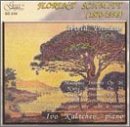| All Artists: Florent Schmitt, Ivo Kaltchev Title: Florent Schmitt Piano music (World Premieres) Members Wishing: 0 Total Copies: 0 Label: Gega Original Release Date: 1/1/2002 Re-Release Date: 11/26/2002 Genre: Classical Styles: Chamber Music, Historical Periods, Classical (c.1770-1830) Number of Discs: 1 SwapaCD Credits: 1 UPCs: 300121302497, 3800121302499 |
Search - Florent Schmitt, Ivo Kaltchev :: Florent Schmitt Piano music (World Premieres)
 | Florent Schmitt, Ivo Kaltchev Florent Schmitt Piano music (World Premieres) Genre: Classical |
Larger Image |
CD Details |
CD ReviewsInteresting re-discovery of evocative piano music, but short Discophage | France | 04/15/2008 (4 out of 5 stars) "Ivo Kaltchev has done public service by unearthing these rare piano compositions by Florent Schmitt.
Other than his "Tragédie de Salomé" and "Psalm 47", Schmitt (1870-1958) hasn't established a position in the standard repertoire. His embrace of Nazism as early as the mid-thirties, and the fact that he always remained true to the compositional style developed in the early decades of the 20th century, even in times of post-war stylistic turmoil and radical embrace of post-webern serialism by the younger French generation around Boulez didn't help, of course. But within his style he had a certain originality and, moreover, a great sense of humor, which shows in the Satie-like tongue-in-cheek titles he gave to some of his compositions, with plays on words most of which cannot be translated in English. Schmitt's piano music is seldom recorded. I am aware of only two other CDs entirely devoted to this aspect of his output, both on small French labels: one in 1986 by Pascal Le Corre on Cybelia (Schmitt:3 Valses Nocturne) and the other by Alain Raes, published by FY first on 2 LPs in 1985, with a partial CD reissue in 1989 (Pieces Romantiques); the latter has now been made available again by Solstice - but apparently not yet on this website. None of the material duplicates with the contents of this Bulgarian-originated Gega CD. It boasts World Premieres, which is only partly true: Musiques Intimes op. 29 was on the FY LPs, but it was left out of the CD transfer. So let's call them CD World Premieres. In the very informative liner-notes that he contributed himself, Kaltchev points out that the pieces comprising the two books of "Musiques Intimes" op. 16 and 29 and "Nuits Romaines" op. 23 were composed in various times (but all between 1891 and 1905) and places and later assembled by the composer into these sets. I'd bet he arranged them in chronological order of composition: the first ones from op. 16 are salon pieces in the style of Chopin (La passeggata al Lido, track 4), Mendelssohn and Grieg. Either Kaltchev doesn't play them in the order indicated on the back cover, or the titles sometimes bear small relation to the pieces' musical and emotional content: "Silence troublé" (something like "disturbed silence") sounds like the merry games of children, and "Dans la forêt ensoleillée" ("in the sun-bathed forest", track 5) like a couple frolicking. As a whole the cycle alternates between the wistful and the playful. In the last pieces of the cycle, and especially "Chanson des Feuilles" ("Song of the Leaves") the language moves in the direction of a turn-of-the-Century evocative impressionism, a development confirmed by the two Nuits Romaines op. 23 and the six Musiques Intimes op 29. In fact "La Chanson de l'Anio" ("The Song of the Anio", track 7 - in fact the Latin word for the Aniene River in Italy, thanks Wikipedia) - has many overtones evocative of Debussy or Ravel, and the notes aptly point to Ravel's Noctuelles from Miroirs in reference to "Lucioles" ("fireflies") track 8). "Glas" ("death knell", or "toll"), the last and longest piece from op. 29, is an extraordinary evocation of tolling bells, and Schmitt's use of the overtones produced by striking a melody in the baritone register simultaneously with a soft unisono in the highest range (0:55) reminds me (but less radically so) of some processes used by Henry Cowell. However, overall the language remains tinged with a romanticism more reminiscent of the minor French post-Debussy impressionists, such as Le Flem, Emmanuel, Ropartz, Tournemire. But it is really the impressionist music of Charles Griffes that comes to mind, and not only because Griffes composed Four Roman Sketches that are a worthy pendant to Schmitt's Nuits Romaines. In view thereof, it comes as no surprise that Kaltchev also made a recording of Griffes' piano music (Charles Griffes). The three pieces from "Small Gestures" op. 92 were composed much later, in 1940 - the second, "Waltzing", has the nostalgic terseness of a Satie waltz, and as much as Debussy's Children's Corner (re the notes) it is again Satie that comes to mind in the saucy jauntiness of the third, "Pacing". "Prelude... pour une suite à venir" (Prelude... for a suite to follow) is Schmitt's last composition, from 1948 and an extraordinary and very unexpected work: it is slow-moving (it does become restless at the end), granitic, dissonant, ritualistic. The mystic music of Dane Rudhyar or Carl Ruggles comes to mind. If he had composed more in that style, no doubt he'd been embraced by Boulez and the serialists. I can't really assess the interpretive merits of Kaltchev for want of any competition, but it seems idiomatic enough (the scores of op 16 and 29 can be downloaded from Every Note for pretty cheap). Good sound. The recording has picked up some of the squeaking of the pedal mechanism, but it isn't obtrusive. The only drawback is that the disc has a TT of only 44:16, a too short measure, all the more so as the quality of the music would have warranted more. But let's not be too finicky which such rare music and welcome what we get. " |
